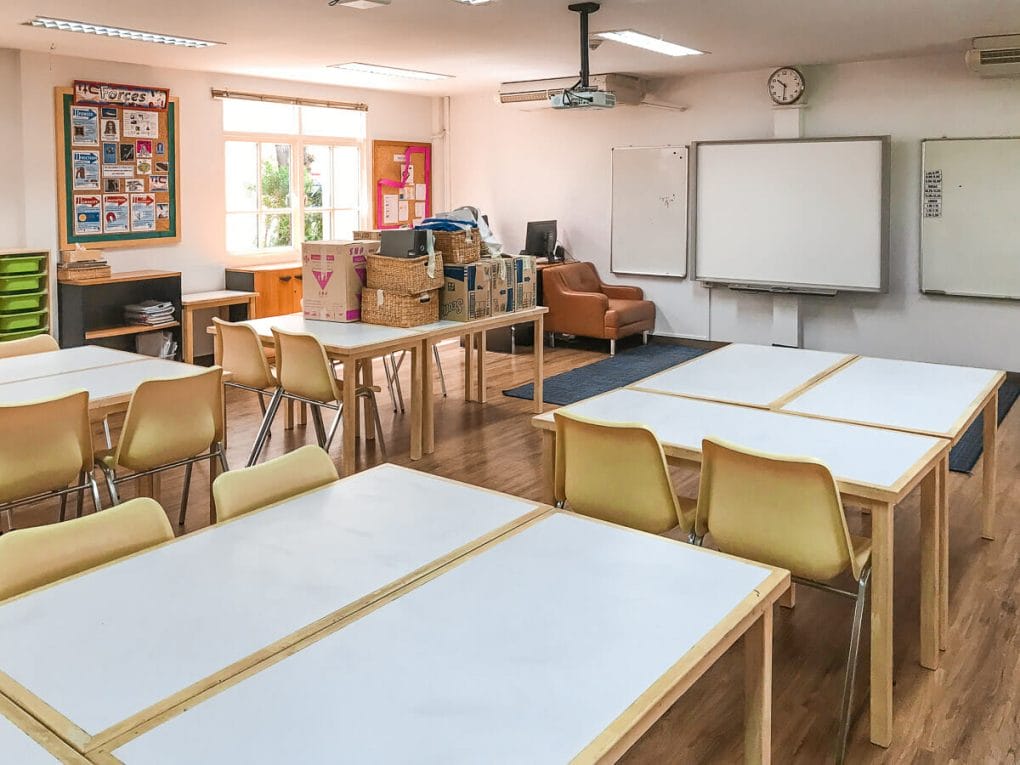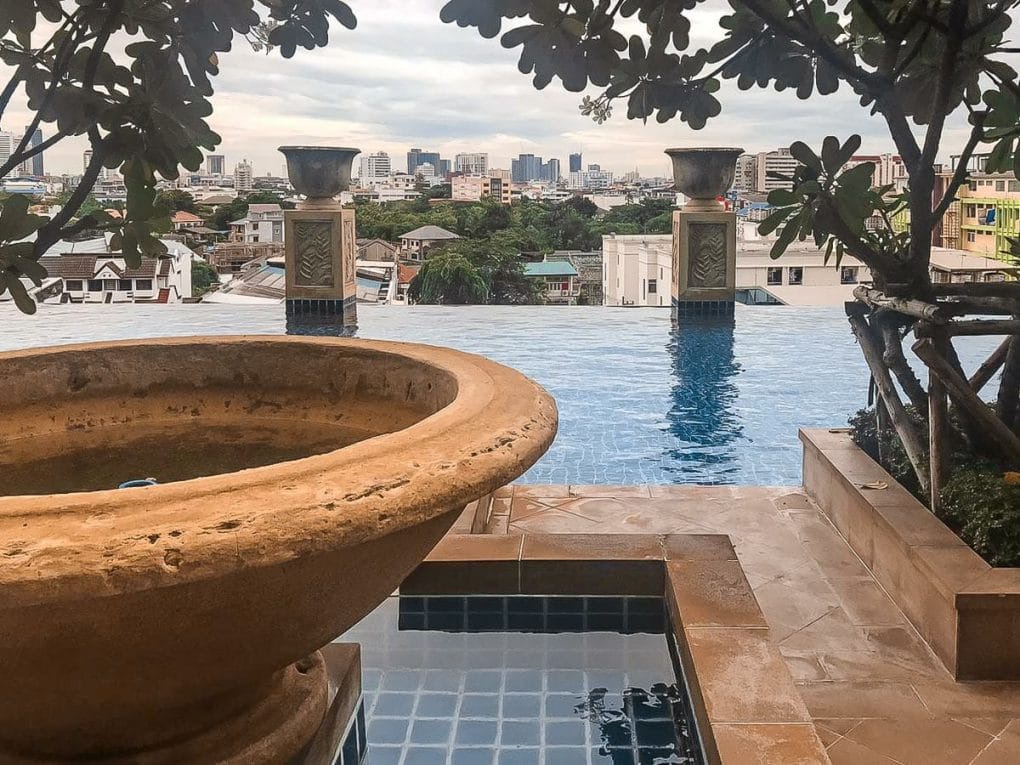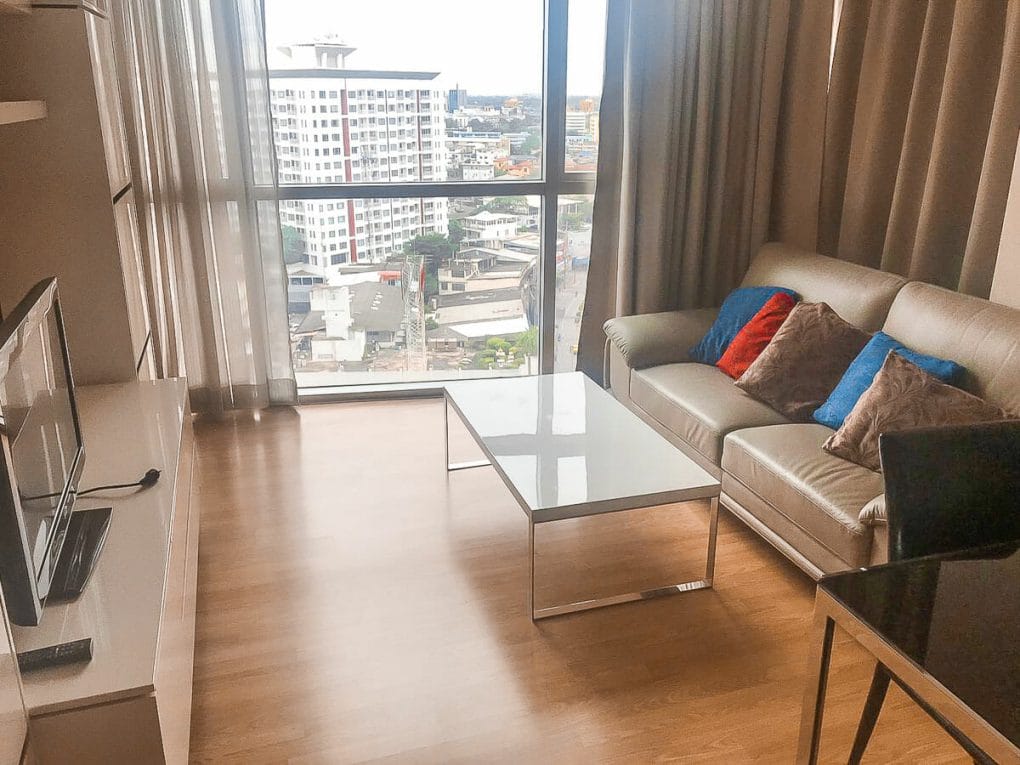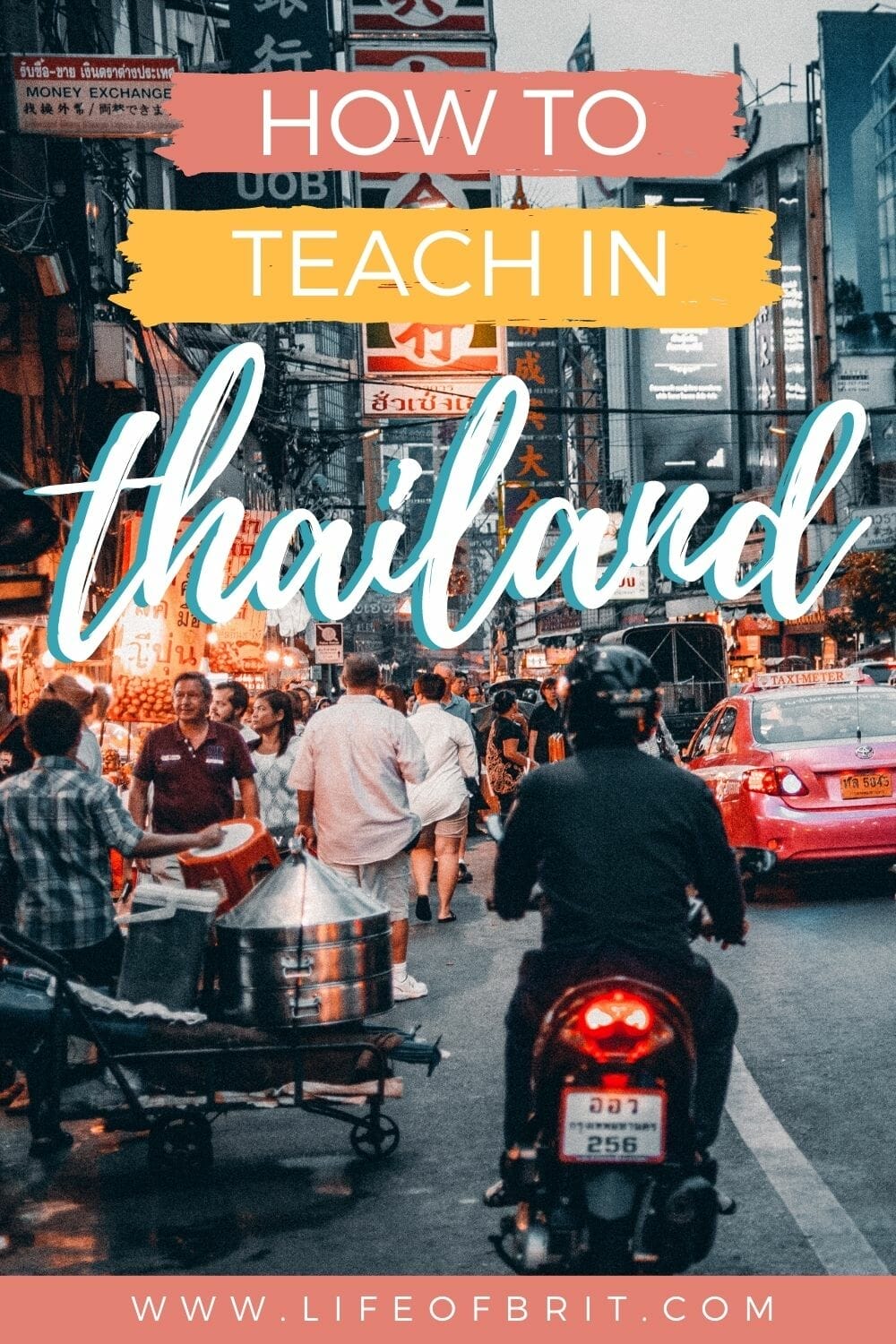Guest Post by Katie O’Donoghue
After working in primary schools back home in the UK, there was one thing that most teachers I worked with had in common. We were miserable. We were working 12+ hour days, taking books home to mark each evening, and spending our weekends planning. That was when I decided I wanted to work abroad.
I first started out teaching in China, but after two years of bad pollution and bitterly cold winters, my husband and I decided that Bangkok was a much better option. Now, I work at a great school in Thailand, and my job gets me home and in our apartment pool by 4 pm every day (if not earlier!)
As a teacher in Thailand, I have never taken work home with me, I can afford to travel and save money, and I also get to experience hot weather all year round. Teaching in Thailand is a dream!
This post may contain affiliate links, meaning at no additional cost to you, if you click my links and make a purchase, I may earn a small commission. Learn more on my disclosure page. Thank you for your support!

Photo by Katie O’Donoghue
Travel and Teaching in Thailand
My husband and I have always loved to travel. Most choose to work abroad as a TEFL teacher, but we were looking for something a little more secure and long term. I was a qualified teacher (see below for more info on that), so it made sense to go into the International school industry.
This means that we get plenty of school holidays to travel around Thailand and Asia, visiting some hidden gems in the country and even enjoy weekend breaks at the beach.
Thailand Teaching Job Requirements For International Schools
To teach primary students in Thailand, you’ll need more qualifications and experience than a TEFL teacher. To begin with, you will need a teaching qualification with QTS (Qualified Teacher Status in the UK) or a teaching license for Americans. To get this, you can either take a Bachelors of Education degree or complete a one year Post Graduate Degree in Education (PGCE).
As a dance graduate who spent a few years teaching dance, I chose the second route, completing my PGCE 4 years after my graduate degree.
Once qualified in the UK, you’ll need to complete an induction year known as your NQT year. Most international schools in Thailand require you to take your NQT, or have at least one year of teaching experience after becoming licensed, in your home country before coming to Thailand. The best international schools will ask for 2-3 years (or more) of teaching experience.
I was fortunate to get a job in China in a city called Tianjin (just outside of Beijing), where I was able to get that first year of experience, so it may be possible for you to get this necessary experiment abroad too.
For my current teaching job in Thailand, the school required a teaching license and experience teaching abroad.
Working Visa in Thailand
All foreigners who wish to work in Thailand must get a Thai work permit and Thai work visa sponsored by a company or school in Thailand. For Thailand, it’s better for you to apply and secure a job before arriving. My visa process from the UK consisted of my employer sending over paperwork which I then submitted to the Thai Embassy in London along with an application form. I could apply online too so the process was easy.
Once we landed in Thailand, our school arranged for us to attend a meeting with embassy representatives to obtain a working permit.
Learn more about how to get a work visa for Thailand.

Typical classroom in Thailand: Photo by Katie O’Donoghue
Teaching Jobs in Thailand
There are lots of different teaching jobs in Thailand that suit all types of teachers.
International School Jobs in Thailand
You will find most international schools in Bangkok. It is worth noting that there are different tiers of International Schools in Bangkok; meaning different schools will ask for different levels of experience but also offer different pay.
Most international schools pay a minimum of 80k+ baht ($2,500) a month, meaning you can live comfortably and travel during your holidays. You will likely get more holidays with this role compared to an English Language school role but the job can be more demanding and you will likely work more hours in the week.
Pros:
- Excellent wage which allows you to live comfortable, travel and save
- Professional working environment
- Manageable hours
- Career security and progression
- School holidays to travel
- Fantastic benefits; full private health insurance, annual flights, housing allowance
Cons:
- Longer working hours
- More experience and qualifications required
Thailand International School Teaching Jobs Salary Range: $2,000 – $3,000+

Nothing better than a rooftop pool – Photo by Katie O’Donoghue
Teaching English in Thailand
Thailand is full of private English Language academies that hire TEFL teachers year round. You can also find TEFL jobs in Thailand at public schools, bilingual private schools, and even international schools. These private positions require far more experience and a teaching license in comparison to a language academy that requires the least experience or qualifications.
To teach English in Thailand, the minimum requirements are; you to be a native speaker, hold a TEFL certificate from a reputable provider, and have a college degree. Schools may prefer previous experience, but it’s not often a requirement. It’s also possible to find jobs without a degree, but they are far and few between and may not pay as well.
Most of these jobs are weekend or evening jobs too, giving you more time during the day to visit the sites or relax by the pool. However, the wage isn’t the best TEFL wage in the world, but it is enough for you to comfortably live in Thailand and travel occasionally.
Pros:
- Good hours
- Less experience required
- Laid-back atmosphere
- Little-to-no planning
Cons:
- Lower salary than other TEFL jobs in the world (however you could try some online English teaching too to boost your income)
- Less technology and facilities available
- Unusual hours; you often work evenings or weekends
Thailand TEFL Salary Range: $800 – $2,000+ per month
Getting TEFL Certified For Thailand
Before venturing off to teach English in Thailand, you definitely should have a reputable and accredited TEFL Certificate secured and ready to go. Don’t have one? That’s ok. Today it’s so easy to get certified online, and as soon as you have one, the world is truly your oyster.
I have the pleasure of offering my readers looking for a quality TEFL course a 20% discount from the courses at iTTT. They’re known to be one of the best TEFL providers and offer phenomenal resources to help you every step of the way.
And not only that, compared to other great yet expensive providers like the International TEFL Academy (consistency ranked #1), and CIEE (one of America’s most popular providers), iTTT is reasonably priced, offers quality 120-hour courses, and is accessible for most prospective teachers!
Learn more about iTTT’s accredited TEFL courses here and check out my iTTT review!
Where to Teach in Thailand?
Most schools, both Language and International, can be found in Bangkok. With so many schools in the city, you have a little more freedom in choosing the right place for you. Plus, Bangkok is an incredible place to live – you get to experience the bustling city life but also try the amazing street food, visit colorful and fun markets like Chatuchak Market and Rot Fai Train Market. There are so many things to do in the city that you will never find yourself bored.
That being said, there are so many beautiful places in Thailand and you can find language schools everywhere. Rayong and Hua Hin are fantastic places to look at, they aren’t too far from Bangkok, making travel to other countries easy but are also right on the beach.
Alternatively, head up North to chic cities like Chiang Mai and Chiang Rai. This is where the Digital Nomads congregate and there is a reason. Expect amazing food, ancient temples, plenty of accommodation options as well as beautiful nature hikes and adventure experiences.

Teaching in Thailand means easy access to beautiful sites like Railay Beach – Photo by life of brit
What does it cost to live in Thailand?
Thailand is no longer the super cheap country that it used to be but it is still a lot cheaper than countries in the West. Prices vary depending on where in Thailand you live, but I have tried to give a rough guide to different types of accommodation and budgets.
Moving to Thailand Start-Up Costs
When you first move over to Thailand, you will need to bring some money with you. Of course there are flights to the country and your initial hotel costs but there are a few other things you will need to consider as well.
Here is an idea of our costs:
- Flights from the UK – £600 each
- Visa fees (covered by the school)
- Hotel cost for first 10 nights whilst looking for an apartment – 30k baht (school covered this cost as part of induction)
- Condo fee – two month deposit and first month rent – 120k baht (we pay 40k baht rent for two-bedroom, two-bathroom apartment in a luxury apartment within 5 minutes from a BTS)

Bangkok apartment – Photo by Katie O’Donoghue
Paying rent
As I mentioned, you will have to pay a deposit; most places ask for a two month deposit and your first months rent.
Rent prices really do vary in Bangkok.
- Studio or one bedroom apartment, not near a BTS = 7,000B – 12,000B ($220 – $380)
- Studio or one bedroom near a BTS = 15,000B – 25,000B ($475 – $800)
- Basic two bedroom near a BTS = 25,000B – 35,000B ($800 – $1100)
- Two bedroom, near a BTS in a luxury condo = 38,000B+ ($1200+)
Cost of living in Bangkok
- Food – Food and drink in Thailand is cheap. On average, we spend 1000 baht for a meal and a few drinks between us. You can also get very cheap food from street vendors and market stalls, with local dishes costing as little as 30 baht.
- Entertainment – Bangkok offers many attractions that are free as well as endless shopping malls and temples with very low ticket prices. You can also go to the cinema or bowling for cheaper prices than you would in the west – a standard ticket costs around 80B.
- Nightlife – One of our favourite things to do in the city is visit a night market. These are free to enter and food and drink is affordable too – a beer costs between 80 – 180B depending on location. Bars around the city offer great happy hours too. Sky Bars are scattered all over the city but expect to pay 250+ for a cocktail.
- Buffets – Another thing we love to do is try the amazing hotel buffets around the city. These are more expensive than your standard restaurant and start at around 2000B per person. However, we use the Eatigo app to save up to 50% by booking a table in advance.

Thai street food is just the best
Prices of Essentials in Thailand
Bottle of water – 10B (~$0.30)
Coffee – 30B ~($1)
Domestic beer from a supermarket – 60B (~$1.90)
Imported beer from a supermarket – 100B (~$3.20)
Pad Thai – 30B (~$1)
Meat and rice – 40B (~$1.25)
Fruit smoothies – 50B (~$1.60)
Western meal – 300B + (~$9.50)
Internet (TrueMove) – 800B including a sim card (~$25)
Water – 80B (~$2.50)
Electricity – 2000B – 4000B (~$63 – $125)
Taxis – fare starts at 35B (~$1.10)
Teaching Resources for Thailand
A few great websites to get you started on your job searching and to help you move to Bangkok include:
- COBIS – This is the official website of the Council of British International schools. This lists schools and jobs and is a great place to start from UK teachers.
- FOBISIA – Here you will find a list of schools and jobs around Asia.
- TES – This is a British site but has lots of great teaching resources (both paid and free). Jobs are also listed here too.
- Teachers Pay Teachers – This is a super helpful website, full of lesson plans and teaching resources; saving you time planning your lessons and giving you creative, fun teaching ideas.
- BK Magazine – Latest Bangkok news and tips for moving and living in Bangkok.
- That Bangkok Life – Bangkok tips, hotel and restaurant reviews, and things to do in the city.
This post may contain affiliate links, meaning at no additional cost to you, if you click my links and make a purchase, I may earn a small commission. Learn more on my disclosure page. Thank you for your support!
What else would you want to know about teaching in Thailand? Let me know in the comments below!



Author

Katie is a primary school teacher, working at an International school in Bangkok. With her husband, she runs Creative Travel Guide and That Bangkok Life, sharing their 10 years of travel together. Follow them on Instagram @thatbangkoklife or check out their video guides on Youtube.



hi Brit. i`m Jay from Malaysia. is there any chance to work as teacher in Thailand and at the same time studying in any course at Thai university? i`m PG student in my hometown but had a dream to migrate to Thailand. you sharing inspire my to rebuild my dream since it devastated because of covid. i intend to apply for training or other education principle related. please share some info..
thank you
Hi Jay! Thank you for your comment 🙂 I’m not sure what the work restrictions are for a student visa in Thailand (you’ll have to check what the rules are for Malaysian citizens studying in Thailand), but I think if immigration allows you to work, finding a job as a private tutor for Thai families or a part-time job at English academies could be possible. You could also consider teaching English online too!
Hi Brit – do you know what the situation is for spouses of teachers? I am a qualified teacher with PGCE/QTS but my husband is a self-employed graphic and interior designer. I have read somewhere that this can be an issue with me getting hired due to visa issues for my husband. Any words of wisdom appreciated!
Kat
Hi Kat! Thank you for your comment. Thailand’s work permit does allow for spouses/dependents to apply for a “Non-O” visa, but your husband wouldn’t be legally allowed to continue his self-employment. If he comes with you on the “Non-O” visa, he could always try to find a local job doing what he does and switch it to a work visa. I’ve also heard rumblings that Thailand is set to approve a visa for freelancers to live in Thailand, which may benefit you if it passes in time. I don’t believe having a dependent or spouse should hinder your job search though, at least not from what I’ve heard! Otherwise, I recommend reaching out directly to your nearest Thailand Embassy to get info directly from them. The internet can be confusing and things change so quickly, it’s always best to hear directly from the source!I’m sorry I couldn’t be of more help! Good luck!
hey, so quick question im due to fly out in September to teach English, i’m worried about being a bit lost over their and lonely, is it easy to just mingle in an find friends out their?
Hi there! Thailand has a very large expat community filled with other English teachers in a similar situation as you so it is definitely easier than other places to meet people and make friends! I recommend joining expat Facebook groups for the city that you’re moving too, and looking into joining local expat clubs, or Thai language classes, as those typically offer the best ways to meet others! I also recommend connecting with other teachers at your school if at all possible 🙂 Have a safe move!
Hi Brit, if choosing to work in an international private school in Bangkok, what are the average working hours per day? Is there time to have a work/life balance? Thanks, David 🙂
Hi David! Thanks so much for your comment! If you choose to work at a private academy in Thailand, the work hours are usually evenings and weekends, which may make socializing difficult if you’re friends with teachers on a public school schedule. However, private academdy teachers tend to work less hours, about 18-25 and also have the whole day free to do with as they choose! Plus you’ll most likely befriend fellow teachers on a similar schedule as you. So ultimately it depends what/when you prefer working 🙂 I hope this helps!
Hi there, great blog post you’ve got there as it’s very helpful! Just one question, with the work visa I know you need to hold a bachelors degree. Do you need a physical copy to then send to the Thai Embassy? And does this need to be ‘certified’ or apostille? Don’t have my physical copy of my degree with me at the moment as I’m residing overseas so just wanted to check what documents are needed before, thanks.
Hello, thank you for your kind words! I believe you need to send an official copy with an Apostille, but not the actual, original copy OR you must bring the original document into your nearest Thai embassy for them to certify its authenticity and create a signed, official copy. The process can vary depending on where exactly/which embassy you’re applying for the work visa, so I recommend reaching out directly to them for their requirements!